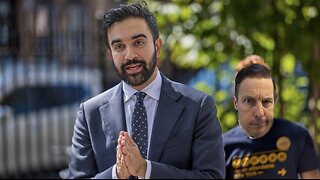Premium Only Content

When You Ignore God’s Voice: The Cost You’ll Pay
#Faith #GodsVoice #Christianity #SpiritualWarning #ListenToGod #FaithTalk #ChristianLife #BiblicalTruth #GospelMessage #SpiritualGrowth #Consequences #Repentance #Obedience #MoralChoice #EternalPerspective #ChurchTalk #SermonSnippet #DailyDevotional #FaithChallenge #TruthMatters
Rejecting God’s voice is not a neutral act; scripture presents it as a verdict that reshapes a person’s moral and spiritual horizon. Jesus warned that those who refuse his words will face the words themselves as judgment, and the New Testament repeatedly frames rejection as a decisive turning away with consequences that extend beyond the immediate moment. Refusal severs a relationship that is meant to ground conscience, hope, and the sense of ultimate meaning, leaving people adrift amid competing claims about what a good life requires.
When individuals choose desire or convenience over divine counsel, the loss shows up first in the inner life: diminished peace, a hardening of heart, and the erosion of moral sensitivity. Biblical narratives and theological reflection describe a downward spiral where refusal breeds blindness, then moral confusion, and finally social breakdown. The pattern appears from Eden to the prophetic books: disobedience opens the way for rationalizations, then for repeated choices that make return harder and spiritual recovery more costly.
The social ripple-effects of rejecting God’s voice turn private choices into public harms. Scripture links communal decline to widespread repudiation of divine standards: families fray, leaders lead poorly, and institutions that depend on shared moral norms weaken, producing injustice and instability. Historical and biblical examples show that when a culture systematically rejects transcendent calling, the resulting vacuum is often filled by factionalism, exploitation, or despair rather than flourishing.
Refusal also carries urgent, eternal dimensions in Christian teaching: it risks forfeiting the blessings and protection that flow from faithful alignment, and it exposes people to final accountability for choices made in time. That accountability is not portrayed as mere punitive retribution but as the logical outcome of having freely rejected the source of life and truth. The warning is meant to awaken repentance, not to terrify—its purpose is to call people back before the consequences become irreversible.
The practical response to this sober diagnosis is a renewed attentiveness to God’s voice in prayer, scripture, and community. Listening is a discipline that reorients desire, repairs relationships, and restores moral clarity; it invites humility, confession, and concrete changes in how we live. To refuse that invitation is to choose a path whose costs compound; to accept it is to reclaim the guidance, protection, and hope that faith promises.
-
 LIVE
LIVE
Right Side Broadcasting Network
7 hours agoLIVE: President Trump Hosts a Press Conference with FBI Director Kash Patel - 10/15/25
10,336 watching -
 LIVE
LIVE
Dr Disrespect
6 hours ago🔴LIVE - DR DISRESPECT - BATTLEFIELD 6 - THE PERFECT WEAPON
1,868 watching -
 1:09:38
1:09:38
vivafrei
1 hour agoLiquid Death-Gate! Text Message-Gate! Ostrich-Gate! AN
20.6K14 -
 44:24
44:24
Clownfish TV
3 hours agoCNN is Angry 'The Male Gaze' Returned! TRADWIVES and SYDNEY SWEENEY are Blamed?! | Clownfish TV
3115 -
 LIVE
LIVE
The HotSeat
1 hour agoAmericans Are Turning Back to God — While Terror Rises Again in Gaza
589 watching -
 LIVE
LIVE
Owen Shroyer
1 hour agoOwen Report - 10-15-2025 - Government Shutdown Political Slop Show Continues
1,035 watching -
 1:26:01
1:26:01
The Quartering
3 hours agoYoung Republican Smear, Woke Sidewalks Washed Away, Major Changes To X & More
75.5K32 -
 1:36:03
1:36:03
Darkhorse Podcast
3 hours agoThe 296th Evolutionary Lens with Bret Weinstein and Heather Heying
5.18K10 -
 LIVE
LIVE
StoneMountain64
1 hour agoI can't stop playing BATTLEFIELD 6
43 watching -
 1:05:17
1:05:17
Jeff Ahern
1 hour agoNever Woke Wednesday with Jeff Ahern
4.58K2